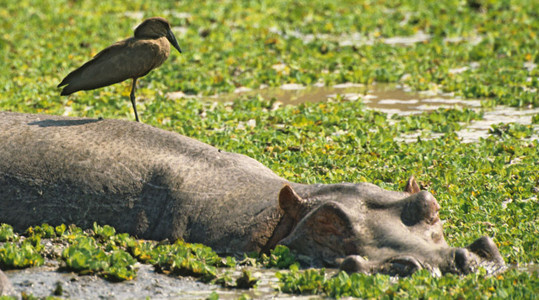
Hippo & Hamerkopf
A hamerkopf takes a ride on a Hippo eating his way through the water hyacinth. [Luangwa River, Zambia]
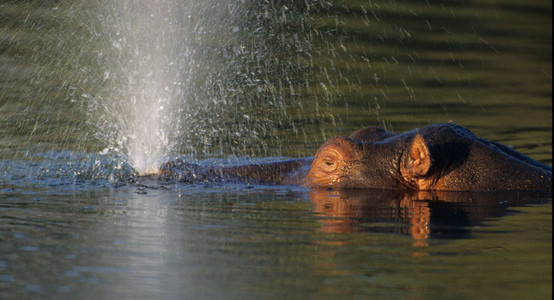
Hippo Resurfacing
A Hippopotamus bull, upon resurfacing, blowing out the water from his nose. [Sabi Sabi (Marine Camp), S. Africa].
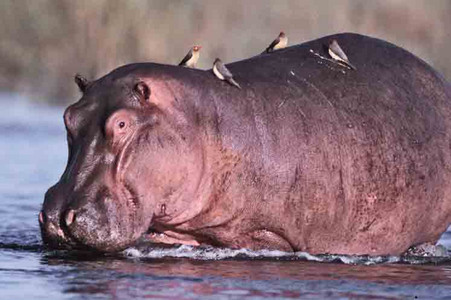
Hippo + Red-Billed Oxpeckers
This Hippo is besieged by red-billed oxpeckers as soon as he emerges from the water. The birds seek the insects feeding in the cracks of the hippo's thick skin. They do not injure the host. Actually, they may do the hippo a service by removing the irritating insects feeding in the cracks of the skin. The birds' sharp-pointed bills probably do hurt. [S. Luangwa NP, Zambia].
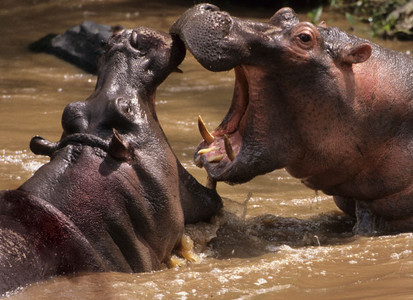
Hippo Contest
Hippopotamus bulls chalenging each other This and the next image illustrate a minor confrontation between two bulls. One bull (R) is the resident of this area of the river. He's just informing the other (L), who is just passing through, whose territory he's in. There will be no fight and no injury incurred. They both know that the 8-inch incisors could inflict serious--even fatal--wounds. {Mara River, Kenya].
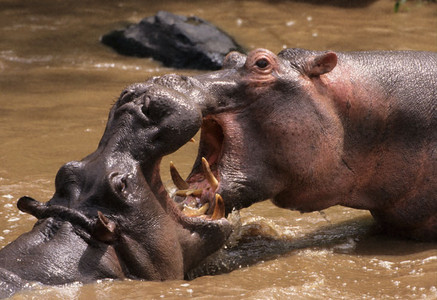
Hippo Contest
A better view of the big incisors in this image of the same two Hippo bulls, and the same minor confrontation. As mentioned previously, the resident bull was just letting the other guy know whose territory he was passing through. [Mara River, Kenya].
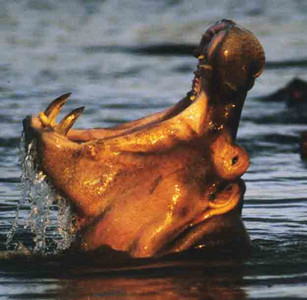
Hippo Yawn
A big yawn, showing off this Hippo bull's 8-inch canines. This is also a dominance display by the alpha bull to the other males in the his school. [Lake Manyara, Tanzania].

Hippo Flip-Flop
Hippopotamus doing flips-1st Image on his back: We arrived at the hide early one morning to find a hippo lying on his back "A dead hippo, I exclaimed!" A couple minutes later, the 'dead' hippo suddenly righted himself. Ten minutes later, he again turned onto his back and remained for 4-5 minutes with his head under water. He kept cycling like this until the sun went down. Switching back and forth had a purpose: he was preventing his skin from drying out & cracking from the hot sun. The water wasn't deep enough for him to submerge his whole body at the same time. [Masuma, Hwange NP, Zimbabwe].

Hippo Flip-Flop
Hippopotamus doing flips-2nd Image: The same hippo, as in the previous image, has righted himself. We observed this cycling for two days. On the third day, he calmly climbed out of the water and disappeared into the countryside. [Masuma Dam, Hwange NP, Zimbabwe].
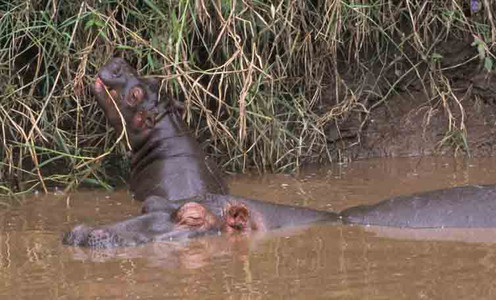
Hippo Mother & Calf
This and the next two images are of a mother Hippo and her very young calf. Its lips are not yet hardened, and so it is unable to grasp and break-off the grass. The calf is about 10 days old. Its birthweight would have been about 50 lbs. [Mara River, Kenya].
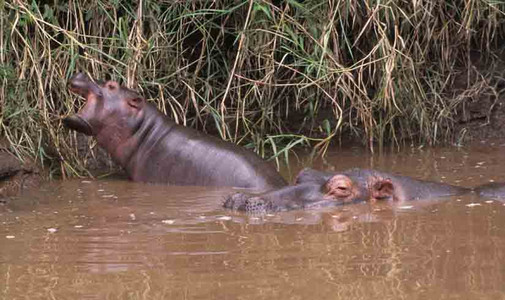
Hippo Mother and Calf
Another view of the mother Hippo and cub. The mother is very protective of her cub. We watched her sally forth and chase off all other hippos (males and females) as they entered her territory enroute up the river. [Mara River, Kenya].
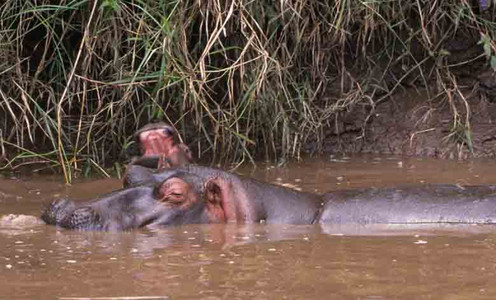
Hippo Mother and Calf
The same Hippopotami as in the preceding two images, providing a good view of the young calf's edentulous mouth. The calf will begin grazing at 2 months, but will continue to nurse until it's a year old. [Mara River, Kenya].

Hippo Family
A group of Hippopotami tending a youngster (approx.1 mo.) as it splashes in the water.In the water, they will protect it from crocodiles, but It is most vulnerable to predation when it's a little older and wanders off while feeding on the grass. [Luangwa River, Botswana]..
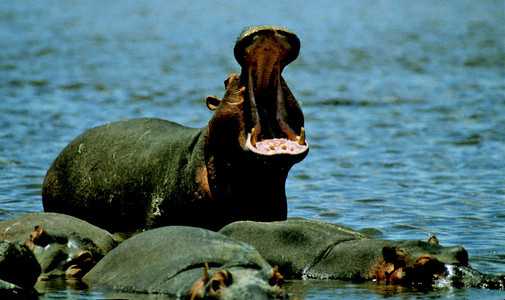
Dominant Hippo
The dominant Hippo male yawning: He lets out a loud grunt (yawn) as a way to declare his dominance and willingness to defend his alpha status to the other bulls in the school. Note the algae beginning to grow on their backs. [Lake Manyara, Tanzania].
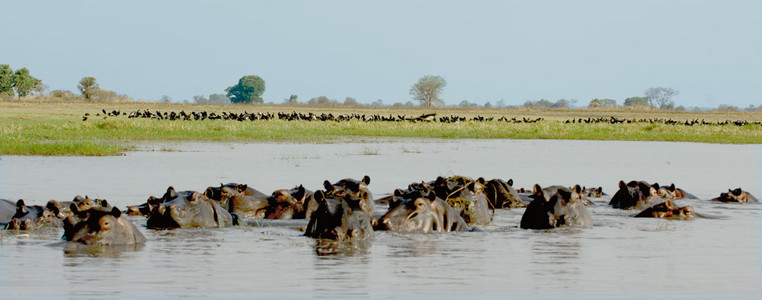
Hippo School
A Hippo school in the lake: There were many large adults present. The bulls are in the foreground. On land in the background is a huge flock of Openbilled Storks. See 'Birds:"Openbilled Storks". [Shumba Area, Zambia]

Hippo School
Double image close-up of the dominant Hippo yawning (L), and of the other large bulls in the group (R). [ Shumba, Zambia].
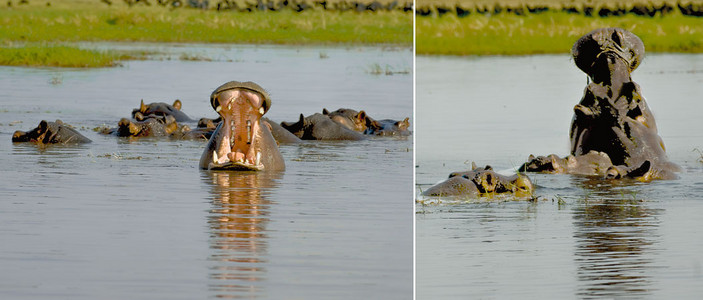
Hippo School
Close-up of the alpha male Hippo yawning showing his large imcisors and the two rows of teeth in the roof of the mouth (L) to facilitate mastication; R, depicts the top & back of the huge upthrust head of a bull. (dbl image): [Botswana].

Hippos Fleeing our Boat
I am photographing from a small boat behind this fleeing hippo family. My guide & I were surprised that they all were so frightened. I would not recommend this procedure be repeated, nor would I consider it for myself, lest next time the hippo bull instead of fleeing, give the order to attack! [Shumba Area, Botswana].